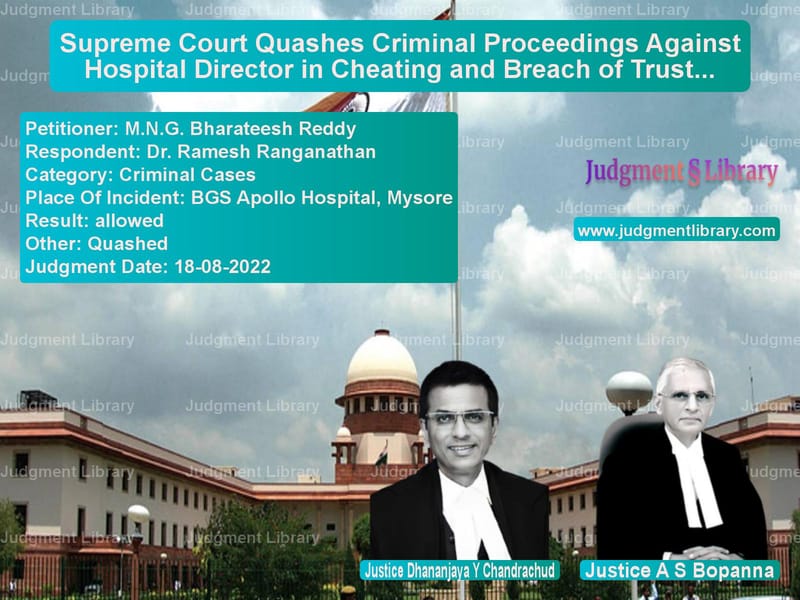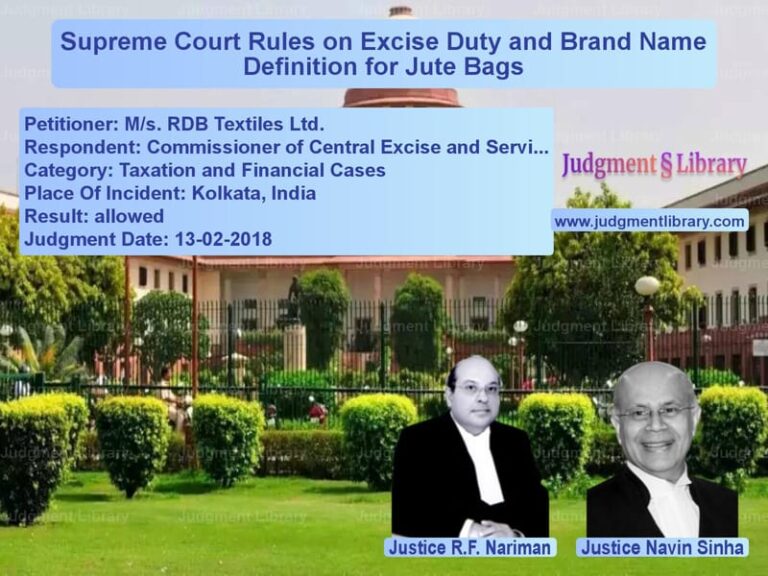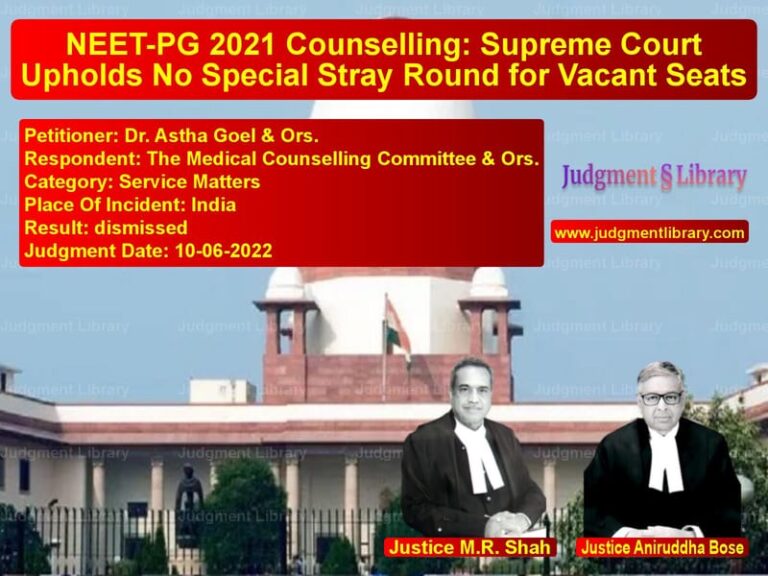Supreme Court Quashes Criminal Proceedings Against Hospital Director in Cheating and Breach of Trust Case
The Supreme Court ruled on a criminal case involving allegations of cheating and breach of trust against a hospital director in Karnataka. The case was filed by a neurosurgeon who claimed he was wrongfully terminated and financially harmed due to fraudulent billing practices. The Supreme Court set aside the Karnataka High Court’s decision and quashed the criminal proceedings, stating that the allegations did not constitute criminal offenses under the Indian Penal Code (IPC).
Background of the Case
The case arose when the complainant, Dr. Ramesh Ranganathan, a consultant neurosurgeon at BGS Apollo Hospital, Mysore, alleged that the hospital’s management engaged in fraudulent billing practices that affected his professional fees. He also claimed that he was wrongfully terminated from his position. The complainant filed a criminal case under Sections 405 (criminal breach of trust), 415 (cheating), and 420 (cheating and dishonestly inducing delivery of property) of the IPC against the hospital’s director, M.N.G. Bharateesh Reddy.
The Judicial Magistrate First Class (JMFC) took cognizance of the case and initiated proceedings. However, the Additional Sessions Judge quashed the order, stating that the complaint did not disclose essential elements of the offenses alleged. The Karnataka High Court later reinstated the charges under Sections 405 and 420 IPC, leading to the present appeal before the Supreme Court.
Arguments Before the Supreme Court
Petitioner’s Arguments (M.N.G. Bharateesh Reddy – Hospital Director)
- The petitioner argued that the dispute was contractual in nature and did not constitute criminal wrongdoing.
- He contended that there was no element of deception or fraudulent inducement required to establish an offense under Sections 415 and 420 IPC.
- He asserted that any grievances related to billing discrepancies should have been pursued through civil remedies, not criminal proceedings.
- He relied on Supreme Court precedents holding that a mere breach of contract does not constitute cheating unless there was fraudulent intent at the outset.
Respondent’s Arguments (Dr. Ramesh Ranganathan – Neurosurgeon)
- The complainant alleged that the hospital deliberately engaged in fraudulent billing practices that reduced his professional fees.
- He contended that the hospital’s actions amounted to misrepresentation and financial loss, satisfying the elements of cheating under Section 420 IPC.
- He claimed that he was wrongfully terminated as part of a scheme to prevent him from recovering his dues.
- He relied on instances where surgery charges were billed incorrectly, showing that the hospital management engaged in deceptive practices.
Supreme Court’s Observations
The Supreme Court examined the allegations and determined that they did not meet the legal requirements for cheating and criminal breach of trust. The Court observed:
“The dispute between the parties arises from a contractual relationship. Mere allegations of wrongful termination and billing discrepancies do not establish the essential ingredients of cheating or criminal breach of trust.”
On the charge of cheating under Section 415 IPC, the Court reiterated the principle established in Hridaya Ranjan Prasad Verma v. State of Bihar, stating:
“Mere failure to keep a promise or breach of contract does not amount to cheating unless fraudulent intent is present from the beginning of the transaction.”
The Court also addressed the allegations of criminal breach of trust under Section 405 IPC and ruled that:
“Entrustment of property is a prerequisite for criminal breach of trust. In this case, no property was entrusted to the accused. At best, the allegations pertain to non-payment of fees, which is a contractual dispute.”
The Court further cited Dalip Kaur v. Jagnar Singh to emphasize that a breach of contract does not constitute an offense of cheating unless there is fraudulent intent from the outset.
Supreme Court’s Verdict
The Supreme Court allowed the appeal and quashed the criminal proceedings against M.N.G. Bharateesh Reddy. The key rulings included:
- The Karnataka High Court erred in reinstating the charges under Sections 405 and 420 IPC.
- The allegations, even if true, did not establish criminal offenses and were better suited for civil proceedings.
- Allowing the prosecution to continue would set a precedent where ordinary contractual disputes are criminalized.
Impact of the Judgment
This ruling reinforces several important legal principles:
- It prevents the misuse of criminal law to settle contractual disputes.
- It reaffirms that allegations of fraud must demonstrate dishonest intent at the inception of a transaction.
- It clarifies that disputes over professional fees and billing discrepancies should be resolved through civil litigation, not criminal complaints.
The judgment sets a precedent protecting professionals and businesses from criminal harassment in commercial disputes while upholding the distinction between civil and criminal liability.
Petitioner Name: M.N.G. Bharateesh Reddy.Respondent Name: Dr. Ramesh Ranganathan.Judgment By: Justice Dhananjaya Y Chandrachud, Justice A S Bopanna.Place Of Incident: BGS Apollo Hospital, Mysore.Judgment Date: 18-08-2022.
Don’t miss out on the full details! Download the complete judgment in PDF format below and gain valuable insights instantly!
Download Judgment: m.n.g.-bharateesh-re-vs-dr.-ramesh-ranganath-supreme-court-of-india-judgment-dated-18-08-2022.pdf
Directly Download Judgment: Directly download this Judgment
See all petitions in Fraud and Forgery
See all petitions in Legal Malpractice
See all petitions in Judgment by Dhananjaya Y Chandrachud
See all petitions in Judgment by A. S. Bopanna
See all petitions in allowed
See all petitions in Quashed
See all petitions in supreme court of India judgments August 2022
See all petitions in 2022 judgments
See all posts in Criminal Cases Category
See all allowed petitions in Criminal Cases Category
See all Dismissed petitions in Criminal Cases Category
See all partially allowed petitions in Criminal Cases Category







